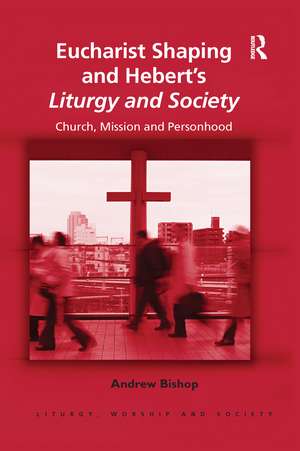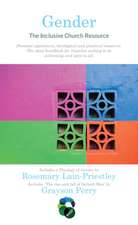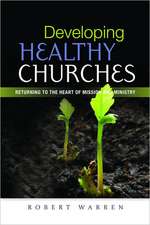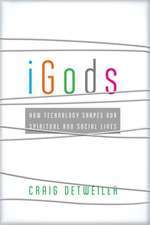Eucharist Shaping and Hebert’s Liturgy and Society: Church, Mission and Personhood: Liturgy, Worship and Society Series
Autor Andrew Bishopen Limba Engleză Paperback – 30 iun 2020
| Toate formatele și edițiile | Preț | Express |
|---|---|---|
| Paperback (1) | 324.58 lei 6-8 săpt. | |
| Taylor & Francis – 30 iun 2020 | 324.58 lei 6-8 săpt. | |
| Hardback (1) | 846.53 lei 6-8 săpt. | |
| Taylor & Francis – 15 apr 2016 | 846.53 lei 6-8 săpt. |
Din seria Liturgy, Worship and Society Series
-
 Preț: 371.24 lei
Preț: 371.24 lei -
 Preț: 349.41 lei
Preț: 349.41 lei -
 Preț: 369.73 lei
Preț: 369.73 lei - 19%
 Preț: 256.48 lei
Preț: 256.48 lei -
 Preț: 457.14 lei
Preț: 457.14 lei -
 Preț: 382.36 lei
Preț: 382.36 lei -
 Preț: 389.66 lei
Preț: 389.66 lei -
 Preț: 380.84 lei
Preț: 380.84 lei -
 Preț: 469.34 lei
Preț: 469.34 lei -
 Preț: 377.45 lei
Preț: 377.45 lei -
 Preț: 416.44 lei
Preț: 416.44 lei -
 Preț: 489.26 lei
Preț: 489.26 lei -
 Preț: 416.22 lei
Preț: 416.22 lei -
 Preț: 469.34 lei
Preț: 469.34 lei -
 Preț: 384.48 lei
Preț: 384.48 lei -
 Preț: 469.34 lei
Preț: 469.34 lei -
 Preț: 395.04 lei
Preț: 395.04 lei -
 Preț: 392.28 lei
Preț: 392.28 lei -
 Preț: 381.72 lei
Preț: 381.72 lei -
 Preț: 380.63 lei
Preț: 380.63 lei
Preț: 324.58 lei
Nou
Puncte Express: 487
Preț estimativ în valută:
62.12€ • 64.61$ • 51.28£
62.12€ • 64.61$ • 51.28£
Carte tipărită la comandă
Livrare economică 12-26 aprilie
Preluare comenzi: 021 569.72.76
Specificații
ISBN-13: 9780367596866
ISBN-10: 0367596865
Pagini: 176
Dimensiuni: 156 x 234 x 12 mm
Greutate: 0.27 kg
Ediția:1
Editura: Taylor & Francis
Colecția Routledge
Seria Liturgy, Worship and Society Series
Locul publicării:Oxford, United Kingdom
ISBN-10: 0367596865
Pagini: 176
Dimensiuni: 156 x 234 x 12 mm
Greutate: 0.27 kg
Ediția:1
Editura: Taylor & Francis
Colecția Routledge
Seria Liturgy, Worship and Society Series
Locul publicării:Oxford, United Kingdom
Cuprins
1. Issues: Participation in a Common Life 2. What I Learnt In The House Of God 3. Let These Dry Bones Live: Ecclesiology 4. Ecclesiology, Incarnation and Dogma 5. Liturgy And Mission: A Case Of Jacob And Esau Or Mary And Martha? 6. Liturgy and Society: Eucharist Shaping 7. Acting in Society: The Ethical-Political Dimension
Notă biografică
Andrew Bishop is a priest of the Church of England. He has served in parishes in London and Basingstoke over fifteen years. Andrew obtained an MTh in Pastoral Theology from Heythrop College, London and DThMin from King’s College, London. He is currently a Residentiary Canon of Guildford Cathedral and Anglican and Coordinating Chaplain to the University of Surrey. He is a member of the Alcuin Club and Society for Liturgical Study.
Recenzii
"Gabriel Hebert's Liturgy and Society is an important book, however its influence has not been fully recognised in contemporary Anglican ecclesiology. In this book, Andrew Bishop addresses that oversight. He engages with Hebert's text in order to explore the place and function of the church in today's world; he enriches our understanding of personhood, worship and mission. By echoing Hebert's non-anxious and generous spirit, this offers a vision of discipleship and witness rooted in the Eucharist whilst remaining attentive to the world." – Julie Gittoes, Residentiary Canon at Guildford Cathedral, UK
"In this study Andrew Bishop re-reads Gabriel Hebert's writings, and, marshalling a range of conversation partners, persuasively argues that a church that is able to participate in the missio dei is a church that is first shaped by worship, and that a church that is shaped by worship is a church that is both in and for the world." – Christopher Irvine, Canon Librarian and Director of Education, Canterbury Cathedral, UK
"In this study Andrew Bishop re-reads Gabriel Hebert's writings, and, marshalling a range of conversation partners, persuasively argues that a church that is able to participate in the missio dei is a church that is first shaped by worship, and that a church that is shaped by worship is a church that is both in and for the world." – Christopher Irvine, Canon Librarian and Director of Education, Canterbury Cathedral, UK
Descriere
Gabriel Hebert's seminal book Liturgy and Society inspired engagement with Eucharistic worship, paving the way for further liturgical reform in the second half of the twentieth century. This book re-examines Hebert's work, doing so uniquely in the light of the current dialogue about Church, liturgy and mission. Bishop argues that Heb








